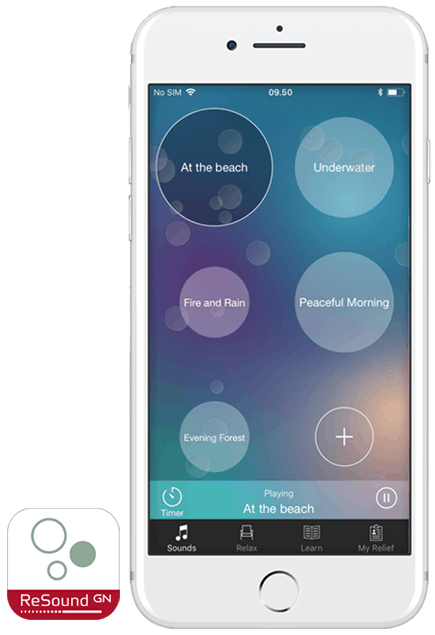Around 80% of people with tinnitus also have hearing loss.1 If you have tinnitus and a hearing loss, however mild, hearing aids may provide relief.2–6 This is because hearing loss is a common contributor to tinnitus;2–4,7–10 so tinnitus can be reduced by correcting hearing loss with hearing aids. Together with a hearing professional (an audiologist or hearing aid dispenser), you can find the best hearing aids for tinnitus.

Tinnitus masking and sound therapy
This is using noise to help mask the troubling sounds of tinnitus. This could be white noise, specialised ear masking noises, low-level music or even your own customised sound. By listening to different types of sounds, it becomes easier to shift your attention away from the tinnitus. Many hearing aids offer forms of sound therapy, these are known as the best hearing aids for tinnitus.

Tinnitus app: ReSound Relief™
We understand that tinnitus is individual. That's why we’ve created a solution you can personalise. ReSound Relief™ is a free tinnitus app that provides sound therapy (‘soundscapes’), relaxing exercises and soothing meditation clips, to ease tinnitus whenever you want and wherever you are. It can be used by anyone suffering from tinnitus, and you don’t have to be a hearing aid user.
The app provides a wide range of sounds that you can ‘mix and match’ and control the volume for. Playing up to five sounds simultaneously means you can create the perfect of background ‘scene’ to relieve your tinnitus.
Hear how soundscapes work by clicking on the buttons below. First, click on the tinnitus description to hear the example tinnitus sound. Then select the recommended soundscape to hear the tinnitus disappear into the background. Get more information about the app and check your smartphone’s compatibility on our tinnitus relief app page.
Tinnitus 1
Play
00:02 /
00:17
Without Soundscape: Cicadas
Tinnitus 2
Play
00:02 /
00:17
Without Soundscape: Heavy Rain
|
 |
You can download ReSound Relief™ for free from the Apple App Store or
get it on Google Play and be on your way to a more comfortable life with tinnitus.
Most tinnitus management programmes provide exercises to teach the brain to be less distracted by tinnitus sounds, while learning to focus on other sounds or things important to you. This includes cognitive behavioural therapy (CBT) and tinnitus retraining therapy (TRT). With the tinnitus sounds relegated to the background, people suffering from tinnitus can focus on the more important things in life.




